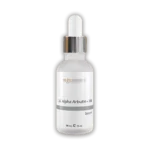Because of the serum’s unique properties, which include brightening the complexion, decreasing indications of aging, and shielding the skin from environmental damage, has become incredibly popular in the cosmetics industry.
A frequently asked topic is if serum may be used at night, even though most people are used to applying it in the morning.
In addition to providing tips on incorporating vitamin C serum into your nighttime beauty routine, this article will examine why taking it at night can be just as helpful as using it in the morning.
Vitamin C Serum
Ascorbic acid, another name for vitamin C, is a potent antioxidant that aids in scavenging free radicals, which are erratic substances that can harm skin cells and hasten the aging process.
Vitamin C aids in preserving the youthful appearance of the skin by lowering oxidative stress. Furthermore, vitamin C is necessary for synthesizing collagen, which is required to maintain the firmness and suppleness of the skin.
When applied topically, vitamin C serum can:
- Brighten Skin Tone: Vitamin C can lessen hyperpigmentation and even out skin tone by inhibiting melanin production.
- Diminish Fine Lines and Wrinkles: Vitamin C reduces the appearance of fine lines and wrinkles by increasing collagen production.
- Guard Against Environmental Damage: Vitamin C’s antioxidant qualities shield the skin from the damaging effects of pollutants and UV radiation.
- Enhance Skin Texture: Vitamin C encourages skin cell regeneration, resulting in a smoother and more radiant complexion.
The Advantages of Vitamin C Serum Use at Night
Improved Skin Restoration
While you sleep, the skin regenerates and repairs itself. Enabling the vitamin C serum to collaborate with your skin’s natural repair mechanisms over the night can encourage this natural healing process. Improvements in skin tone, texture, and overall look may result in more obvious ways.
Stopping Oxidative Stress
Although vitamin C is well-known for its ability to shield the skin from environmental stresses during the day, it can also be helpful at night.
Even after the sun sets, environmental stressors like pollution can release free radicals. Using a serum at night can help combat these free radicals and stop additional skin damage.
Enhanced Uptake
At night, the skin’s permeability tends to increase, making active substances more receptive. When serum is applied prior to going to bed, it can absorb into the skin more deeply, increasing its effectiveness. This improved absorption may strengthen the serum’s brightening and anti-aging properties.
Decreased Probability of Sensitivity
Some people may become sensitive or irritated when taking vitamin C serum during the day, especially if it’s mixed with other active components like sunscreens or retinoids. Using the serum at night reduces the possibility of interactions and gives your skin more time to adjust to the substance.
Complementary to Additional Products for the Night
Vitamin C serum is a useful addition to any other substances you use in your evening routine, including peptides, hyaluronic acid, or retinoids. These substances combine well with vitamin C, amplifying their overall effects and helping create a more thorough skincare routine.
How to Make Vitamin C Serum Part of Your Evening Routine
Cleaning
To begin with, wash your face to remove excess oil, makeup, and pollutants. A clean canvas ensures more efficient serum absorption.
The Toning
Use a toner to bring your skin’s pH levels back into equilibrium and get it ready for more skincare products. This action may enhance serum vitamin C’s absorption.
Using Vitamin C Serum
Using your fingertips, lightly apply a few drops of serum to your face and neck. Avoid applying too close to your eyes because the skin there is sensitive.
hydrating
Apply a moisturizer afterwards to seal in the serum and give your skin extra moisture. This will avoid dryness and preserve the skin’s moisture barrier.
Extra Medical Interventions
Apply any additional products or treatments, including retinoids or exfoliants, by your particular regimen if you use them in your evening routine. Before adding more products, ensure the serum has had time to absorb.
Sunscreen (For Use in the Morning)
While this article mainly discusses using serum at night, it’s crucial to remember that sunscreen should also be applied during the day. Sunscreen enhances the antioxidant defense that vitamin C offers by shielding the skin from UV rays.
Possible Things to Think About
Sensitivity
Serum use may cause sensitivity in certain people. If you’re new to it or have sensitive skin, start by using vitamin C every other night to gauge your skin’s tolerance. As your skin adjusts to the substance, gradually increase the frequency.
Storage
Serums’ sensitivity to light and air can lead to deterioration and decreased efficacy. To keep your serum effective, keep it somewhere cold and dark.
Patch Testing
To be sure you don’t have any negative side effects, conduct a patch test prior to adding a new vitamin C serum to your regimen. Spoon a tiny bit of the serum onto a discrete section of your skin, then watch for any irritation.
To read more blog: Best Sunblock in Pakistan-Your Ultimate Guide
Final Thoughts
Enhancing your skincare routine at night with vitamin C serum can be successful. By taking advantage of the skin’s natural repair mechanisms while you sleep, you can get the most out of this potent antioxidant and have a more radiant, younger-looking complexion.
Including a serum in your evening regimen can help maintain your skin’s general health and resilience when combined with appropriate washing, toning, and moisturizing.
Depending on how the serum fits into your overall routine and how your skin responds to it, you may apply it in the morning or at night. The serum is valuable to your daily routine because it may significantly improve your skin’s radiance, firmness, and resilience regardless of when you use it.





Excellent write-up, thanks for sharing such valuable content with us!